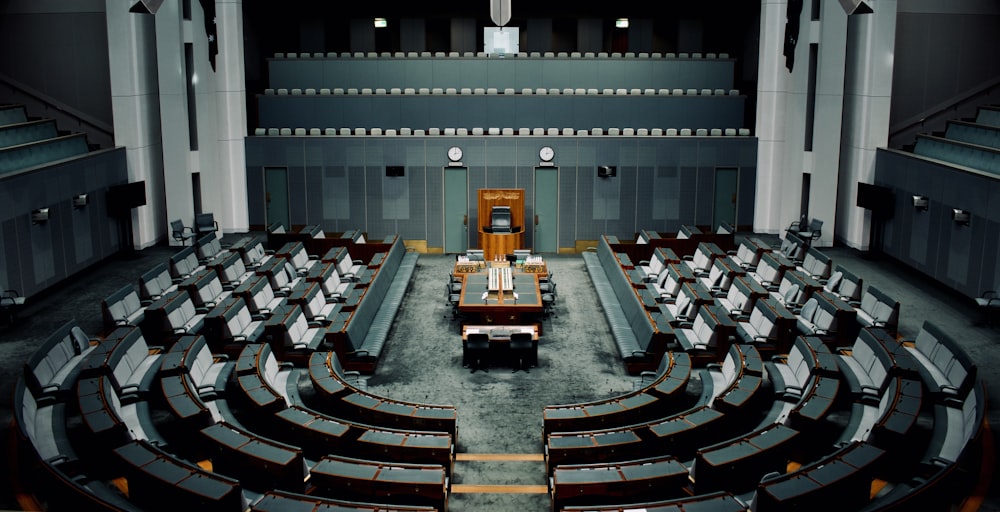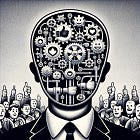In politics, the truth is not self-evident. So why do we act as if it is?
People are "naive realists" about politics, treating their beliefs as objective, unbiased, and unmediated interpretations of self-evident facts. I explore the roots of this harmful delusion.
Public opinion deals with indirect, unseen, and puzzling facts, and there is nothing obvious about them.
—Walter Lippmann
Politics is more difficult than physics.
— Einstein
I. The truth is not self-evident
In forming political beliefs, we are confronted with a daunting task. The modern world is vast and complex. Our information is limited. Moreover, we acquire this information almost entirely from others—journalists, politicians, pundits, and so on—and we interpret it through highly selective, low-resolution mental models that reduce reality to a manageable form. In other words, our understanding of the political universe is profoundly mediated. It is stitched together from the reports, gossip, ideas, and theories of those we trust, and it is filtered through simplifying categories, stories, and explanatory frameworks. In most cases, it is also biased by motives such as self-justification, reputation management, and tribal signalling.
For these and many more reasons, the political beliefs we develop are highly fallible. At best, the mental pictures that make up our political outlook—what Walter Lippmann called our “pseudo-environments”—are selective, simplistic, and distorted representations of a more complex, ambiguous, and disagreeable reality. At worst, they might be completely delusional. After all, it is painfully obvious that other people—people who endorse mistaken political views—are unaware that their views are mistaken. But then how do we know we are any different from them?
Many people never reflect on the fallibility of their political outlook in this way. Even when it comes to highly complex topics where well-informed experts disagree—economics, geopolitics, social justice, crime, gender, race, immigration, and so on—many treat their political beliefs and preferences as self-evidently correct. They are what psychologists call “naive realists”, embracing the view that
“I see entities and events as they are in objective reality… [M]y social attitudes, beliefs, preferences, priorities, and the like follow from a relatively dispassionate, unbiased, and essentially “unmediated” apprehension of the information or evidence at hand.”
In addition, they tend to think “the information or evidence at hand” is all the relevant evidence there is. In Daniel Kahneman’s terminology, they fall prey to the WYSIATI (“what you see is all there is”) bias.
Naive realism is not just a mistake. It is a harmful mistake. Because people are naive realists, they tend to think the solutions to political problems are self-evident. This causes lots of bad politics and drives popular support for demagogues who promise to force through “obvious” policies. Further, if the truth is self-evident, people who deny the truth must either be liars, stupid, or crazy. This view is of course ubiquitous in political debate, from conservatives who dismiss progressives as victims of a “woke mind virus” to liberals who view conservatives as victims of “misinformation” and “post-truth.” As Walter Lippmann noted over a century ago,
“He who denies my version of the facts is to me perverse, alien, dangerous. How shall I account for him? The opponent has always to be explained, and the last explanation that we ever look for is that he sees a different set of facts.”
Here is my question: Why are people naive realists? The truth in politics is rarely self-evident, so why do so many people act as if it is?
II. The Roots of Naive Realism
The disappointing answer is that I do not know. However, here are six possible explanations. Importantly, they are not exclusive. Multiple factors might be relevant, and different factors might be relevant in different cases. Moreover, perhaps there are others I do not list here, in which case I would love to hear about them.
Ignorance
Evolutionary mismatch
No skin in the game
Social benefits
Politics demands action
The problem of unilateral reasonableness
Ignorance
I do not know what the capital city of Estonia is. Why? Because I never learned it. Perhaps something similarly mundane is true when it comes to naive realism: Naive realists have simply never learned that politics is complicated and that their political views are simplistic and overconfident at best. That is, they are simply ignorant of the many sources of fallibility that shape political worldviews.
I find this difficult to believe. I am ignorant of the capital of Estonia because I never bothered to learn it, but the truths naive realists are ignorant of seem to be staring them in the face. It just seems obvious that our political outlooks are heavily mediated and highly fallible.
At the same time, maybe my resistance rests on a kind of naive realism of its own. For most of my life, I had absurdly overconfident political views. If I look back, the main reason I am not a naive realist today is that I read about political psychology and political epistemology, and I tried to understand why so many smart people saw things very differently. Maybe this simple explanation is correct, then. If so, it has an optimistic implication: that the solution to naive realism is simply to persuade people with information and arguments that their political views are more subjective, biased, and fallible than they recognise.
Evolutionary mismatch
For almost all of human history and prehistory, humans—including the ancestors of our species—lived in small-scale social worlds. Activities (foraging, hunting, rituals, etc.) were local, political decision-making concerned fairly simple matters, and people would know everyone in their political community.
In such contexts, people are in much closer contact with political facts, and such facts are much less complex. Given this, the kinds of tendencies associated with naive realism today—a high degree of confidence in political beliefs, the treatment of political truths as self-evident, and so on—probably would not have been so unreasonable. If so, perhaps naive realism today is just the application of psychological tendencies adapted to a very different social world.
For an analogy, consider our love for sugar and fats. In ancestral environments in which such things were scarce, this love was highly adaptive. In modern environments in which you can go to a supermarket and buy large tubs of ice cream very cheaply, the result is widespread obesity, diabetes, and so on. Similarly, perhaps the basic way in which we think and reason about politics was adapted to small-scale social worlds, and it is only when it is applied to the unimaginably vast, complex modern environment that it becomes so unreasonable.
No skin in the game
When mistakes are costly, people tend to learn about them and avoid them. Naive realism seems costly. So why don’t people learn it is a mistake? A plausible answer is that the costs of naive realism are negative externalities: even though there are big social costs when naive realism is widespread, individuals do not incur these costs personally because individual votes have almost no impact on political outcomes. That is, even if you are extremely unreasonable, your unreasonableness will not impact political decision-making at all. That means you have no incentive not to be unreasonable. Of course, if everyone is unreasonable, the result is, well, the disaster of modern politics. However, people make decisions for themselves—in response to their own incentives—and not for the common good.
In principle, this explains why people are not motivated to learn that naive realism is mistaken, and more generally why people tend to be extremely unreasonable in politics. However, it does not explain why individuals find naive realism so plausible or attractive in the first place.
Social benefits
Perhaps naive realism is not just personally costless. Perhaps it has benefits too. When people think in unreasonable ways, it is often because it promotes their interests or practical goals. “It is difficult to get a man to understand something,” wrote Upton Sinclair, “when his salary depends on his not understanding it.” Maybe it is difficult to get people to understand the partiality and fallibility of their political beliefs because their interests depend on not understanding such things.
Why might this be? Elsewhere, I have written extensively about how political beliefs serve social functions. Democratic politics is fundamentally a process in which groups compete for power, status, and resources. Under such conditions, it is important for groups to be highly cohesive. Successful groups often achieve this by sending and monitoring signals of tribal solidarity. This tribal signalling can shape how people behave in important ways. I think it can also shape what people believe.
If so, this suggests an explanation of naive realism: To signal that one is a good and loyal member of one’s political tribe, one should endorse its defining ideological narrative with extreme confidence. From the perspective of trying to form an accurate model of the world, this might be irrational. From the perspective of winning approval within one’s tribe, however, it might be rational.
I think there is something right about this explanation in some cases. However, I am unsure how much of the phenomenon it explains. I get the sense that people instinctively default to naive realism even in the absence of tribal signalling, and that naive realism often underlies tribalism—people join tribes that share their naively realistic understanding of politics—rather than vice versa.
Politics demands action
From the perspective of learning about the world, it is possible to tolerate a large amount of agnosticism and uncertainty. However, politics is not fundamentally about truth. It is about action. To paraphrase Marx, the point is not to interpret the political world but to change it. From this perspective, epistemic and practical goals might come into conflict. At some point, you need to stop deliberating, thinking, learning, and so on, and act.
Perhaps naive realism is a response to this fact. Yes, highly confident black-and-white views about politics might be undesirable from the point of view of figuring out the truth, but they might be necessary from a practical point of view. In political competition, success often flows to those who are the most energetic, single-minded, obsessive, passionate, and so on, and maybe such traits demand a naively realistic understanding of politics. As Jeffrey Friedman puts it,
“One does not attend a rally or demonstration if one is interested in a reasoned, balanced discussion, fair to all sides, that cautiously and carefully attempts to parse the evidence and incrementally approach the truth. One attends only if one thinks that one already knows the truth.”
When I think about my own life, this makes a lot of sense. I used to be much more involved in politics. As I have gotten older, I feel I have become wiser and more reasonable, but this has come at the cost of political passion. On most political topics, I find it very difficult to have strong opinions. I am acutely aware of how complex issues are, that very clever people disagree about them, and that figuring out the truth is extremely challenging. This awareness might be intellectually virtuous (I would like to think so), but it has come at the cost of fully participating in politics. Given this, it makes sense to me that people who are strongly motivated to participate in politics must lack the awareness.
The problem of unilateral reasonableness
Finally, I think there might be another subtly related thing going on. Suppose I reduce my confidence in my political worldview, and come to recognise it as an inevitably selective, partial, and biased depiction of a more complex and disagreeable reality. If I do this, I will likely have less impact on politics. I will appear less confident, less sure of my views, and less passionate. I will be less capable of arguing my case. The problem is that it seems strange I should do this unilaterally. That is, if other people remain naive realists, they will have a greater impact on politics than I have, which seems both unfair and undesirable. In fact, inasmuch as it cedes greater influence to the least reasonable among us, it seems perverse. Even from a purely altruistic perspective, surely the last thing we want is for reasonable people—those capable of acknowledging uncertainty and fallibility—to remove themselves from the pool of passionate political activists.
Give this, naive realism is associated with a kind of tragedy of the epistemic commons. Even if we would all be collectively better off if we became more reasonable in politics, this will only work if we could somehow coordinate to become more reasonable at the same time. From the perspective of individuals, they will—correctly—view unilateral reasonableness as unreasonable.






I might add one more—not mutually exclusive—reason for naive realism in politics: the conflicting selection pressures between within-group competition for social partners and between-group competition for power and resources. Within groups, we have an incentive to avoid interacting with dishonest, manipulative, unreasonable, simplistic, self-serving, and untrustworthy people. So any signs of these traits triggers social disgust and avoidance. But between groups, we have an incentive to create propaganda that mobilizes the group against rivals, coordinates the group (which requires simpler vs. complex info and categorical vs. continuous info), creates trust and common knowledge that others will commit to the collective action and not chicken out, and reduces the likelihood of defection to rival groups, regardless of truth. There’s a conflict here. We must spread propaganda that we’re not spreading propaganda. We must lie that we’re not lying, bullshit that we’re not bullshitting, manipulate each other into thinking that we’re not manipulating each other, etc. Because if we don’t, we’ll see ourselves as dishonest, irrational, manipulative people, and destroy our desire to associate with one another, unraveling the group from within. So we need naive realism (and other sacred narratives) to stably exist as a competitive group at all. This is similar to your point on action, but fleshes it out a bit more. I write about this in my preprint on social paradoxes. I’m curious if you buy the argument.
https://osf.io/preprints/psyarxiv/avh9t
I think that if you say that a social problem is complex, people will accuse you of not caring enough about the problem. People who espouse naive realism come across as being more caring, so naive realism gets socially rewarded rather than punished. I will say more about this in a post scheduled for 3/22.